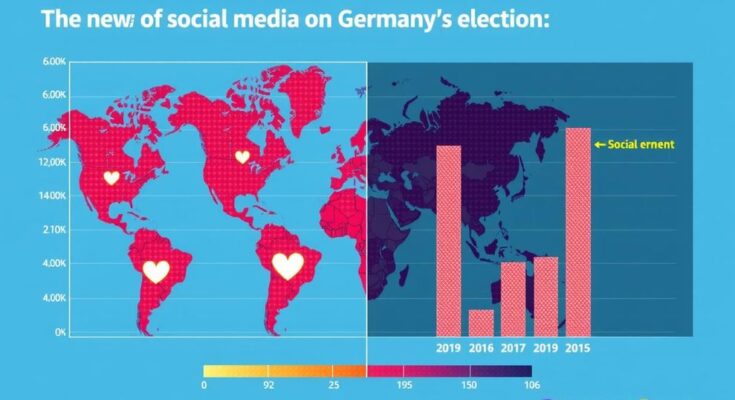Elon Musk’s recent support for the far-right AfD in Germany’s elections has sparked significant controversy, with debates over his potential to influence voter sentiment and allegations of election interference. Despite heightened screen visibility for the AfD, recent polls show their voter support remains stable and unaltered. The legality of Musk’s actions is under investigation, with implications for the role of social media in political discourse.
In late December, Elon Musk, the influential tech billionaire and owner of X, ignited controversy in Germany after proclaiming that “only the AfD can save Germany” amid an election campaign targeting the new government. Despite mounting criticism from German politicians, including comparisons to Russian President Vladimir Putin, Musk remained steadfast, even publishing an op-ed in support of the far-right party Alternative for Germany (AfD). This legislative body is designated as a suspected extremist organization due to its affiliations with neo-Nazi groups and extreme ideologies.
Following his remarks, Musk conducted a live discussion with AfD’s candidate for chancellor, Alice Weidel, which raised questions regarding potential election interference and freedom of expression. Although German Chancellor Olaf Scholz responded to Musk’s provocations by stating, “Don’t feed the troll,” the legality of Musk’s actions remains ambiguous. Experts assert that unless his statements constitute slander or incitement to hatred, legal action against him would be difficult to substantiate. Nevertheless, Musk’s ownership of the platform X is significant as it has allegedly amplified Weidel’s posts considerably.
Data indicates that Weidel’s posts received an average of one million impressions following Musk’s engagement—a staggering rise from under 200,000 previously. The implications of manipulated algorithms and potential illegal party donations are under investigation by German lawmakers. Moreover, although donations from outside the EU are restricted, loopholes might exist that Musk could exploit, raising further concerns regarding transparency in the political funding landscape.
Despite Musk’s extensive reach on social media, experts believe his influence on the upcoming election on February 23 may not be as robust as anticipated. Polls indicate the AfD’s voting intention has remained steady, highlighting that dissatisfaction with the current government does not necessarily translate to increased support for the AfD. The current milieu suggests a cautious observation regarding Musk’s potential impact on voter sentiment and his role in catalyzing polarization in the political discourse.
The article discusses the political implications of Elon Musk’s engagements concerning the upcoming German elections, particularly his support for the far-right Alternative for Germany (AfD). This political party is deemed extremist within German politics, with links to neo-Nazi organizations, and has historically been marginalized by other political entities. Musk’s influence through social media and his advocacy for the AfD raise complex questions about electoral interference, free speech, and the impact of online platforms on political landscapes, thus prompting legal and societal scrutiny.
Ultimately, while Musk’s visibility and statements may contribute to heightened attention towards the AfD, the actual political ramifications regarding voter support remain uncertain. Legal implications regarding foreign involvement in German elections demand close monitoring, particularly as the election date approaches. Thus, the discourse surrounding Musk not only reflects immediate political tensions but also encapsulates broader concerns regarding the integrity of democratic processes in the digital age.
Original Source: www.euronews.com




